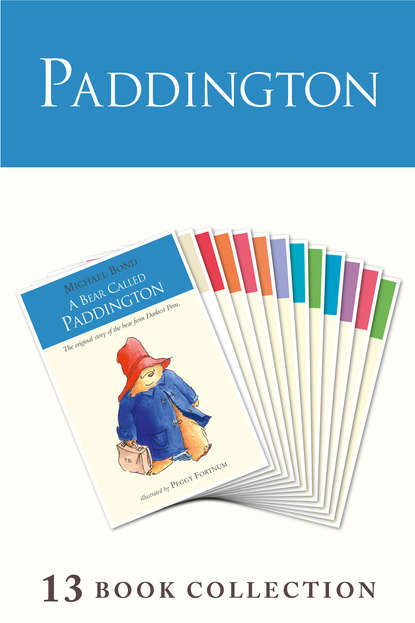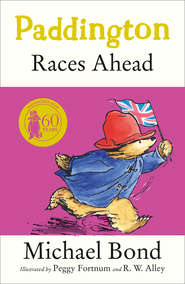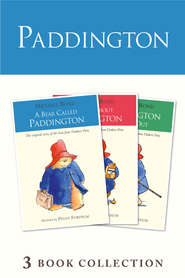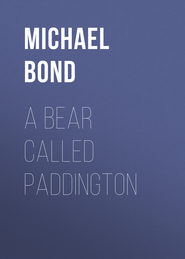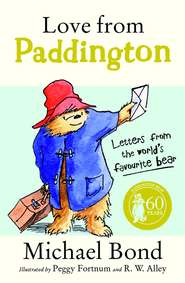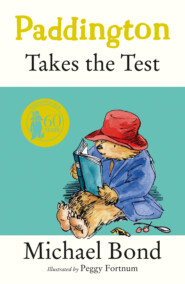По всем вопросам обращайтесь на: info@litportal.ru
(©) 2003-2025.
✖
Paddington Complete Novels
Настройки чтения
Размер шрифта
Высота строк
Поля
“However did you know that?” he said.
“I’m a detective,” said the man. “It’s my job to know these things. We’re always on the look-out for criminals.”
“But I’m not a criminal,” said Paddington hotly. “I’m a bear! Besides, I was only tidying up the window…”
“Tidying up the window,” the detective spluttered. “I don’t know what Mr Perkins will have to say. He only dressed it this morning.”
Paddington looked round uneasily. He could see Mrs Brown and Judy hurrying towards him. In fact, there were several people coming his way, including an important-looking man in a black coat and striped trousers. They all reached him at the same time and all began talking together.
Paddington sat down on his case and watched them. There were times when it was much better to keep quiet, and this was one of them. In the end it was the important-looking man who won, because he had the loudest voice and kept on talking when everyone else had finished.
To Paddington’s surprise he reached down, took hold of his paw, and started to shake it so hard he thought it was going to drop off.
“Delighted to know you, bear,” he boomed. “Delighted to know you. And congratulations.”
“That’s all right,” said Paddington, doubtfully. He didn’t know why, but the man seemed very pleased.
The man turned to Mrs Brown. “You say his name’s Paddington?”
“That’s right,” said Mrs Brown. “And I’m sure he didn’t mean any harm.”
“Harm?” The man looked at Mrs Brown in amazement. “Did you say harm? My dear lady, through the action of this bear we’ve had the biggest crowd in years. Our telephone hasn’t stopped ringing.” He waved towards the entrance to the store. “And still they come!”
He placed his hand on Paddington’s head. “Barkridges,” he said, “Barkridges is grateful!” He waved his other hand for silence. “We would like to show our gratitude. If there is anything… anything in the store you would like…?”
Paddington’s eyes gleamed. He knew just what he wanted. He’d seen it on their way up to the outfitting department. It had been standing all by itself on a counter in the food store. The biggest one he’d ever seen. Almost as big as himself.
“Please,” he said. “I’d like one of those jars of marmalade. One of the big ones.”
If the manager of Barkridges felt surprised he didn’t show it. He stood respectfully to one side, by the entrance to the lift.
“Marmalade it shall be,” he said, pressing the button.
“I think,” said Paddington, “if you don’t mind, I’d rather use the stairs.”
(#ulink_2e955591-b975-5894-8403-9832ec70ad5e)
PADDINGTON SOON SETTLED down and became one of the family. In fact, in no time at all it was difficult to imagine what life had been like without him. He made himself useful about the house and the days passed quickly. The Browns lived near the Portobello Road where there was a big market and quite often, when Mrs Brown was busy, she let him go out to do the shopping for her. Mr Brown made a shopping trolley for him – an old basket on wheels with a handle for steering it.
Paddington was a good shopper and soon became well known to all the traders in the market. He was very thorough and took the job of shopping seriously. He would press the fruit to see that it had the right degree of firmness, as Mrs Bird had shown him, and he was always on the look-out for bargains. He was a popular bear with the traders and most of them went out of their way to save the best things of the day for him.
“That bear gets more for his ten pence than anyone I know,” said Mrs Bird. “I don’t know how he gets away with it, really I don’t. It must be the mean streak in him.”
“I’m not mean,” said Paddington, indignantly. “I’m just careful, that’s all.”
“Whatever it is,” replied Mrs Bird, “you’re worth your weight in gold.”
Paddington took this remark very seriously, and spent a long time weighing himself on the bathroom scales. Eventually he decided to consult his friend, Mr Gruber, on the subject.
Now Paddington spent a lot of his time looking in shop windows, and of all the windows in the Portobello Road, Mr Gruber’s was the best. For one thing it was nice and low so that he could look in without having to stand on tiptoe, and for another, it was full of interesting things. Old pieces of furniture, medals, pots and pans, pictures; there were so many things it was difficult to get inside the shop, and old Mr Gruber spent a lot of his time sitting in a deck-chair on the pavement. Mr Gruber, in his turn, found Paddington very interesting and soon they had become great friends. Paddington often stopped there on his way home from a shopping expedition and they spent many hours discussing South America, where Mr Gruber had been when he was a boy. Mr Gruber usually had a bun and a cup of cocoa in the morning for what he called his ‘elevenses’, and he had taken to sharing it with Paddington. “There’s nothing like a nice chat over a bun and a cup of cocoa,” he used to say, and Paddington, who liked all three, agreed with him – even though the cocoa did make his whiskers go a funny colour.
Paddington was always interested in bright things and he had consulted Mr Gruber one morning on the subject of his Peruvian centavos. He had an idea in the back of his mind that if they were worth a lot of money he could perhaps sell them and buy a present for the Browns. The one pound a week pocket-money Mr Brown gave him was nice, but by the time he had bought some buns on a Saturday morning there wasn’t much left. After a great deal of consideration, Mr Gruber had advised Paddington to keep the coins. “It’s not always the brightest things that fetch the most money, Mr Brown,” he had said. Mr Gruber always called Paddington ‘Mr Brown’, and it made him feel very important.
He had taken Paddington into the back of the shop where his desk was, and from a drawer he had taken a cardboard box full of old coins. They had been rather dirty and disappointing. “See these, Mr Brown?” he had said. “These are what they call sovereigns. You wouldn’t think they were very valuable to look at them, but they are. They’re made of gold and they’re worth fifty pounds each. That’s more than one hundred pounds for an ounce. If you ever find any of those, just you bring them to me.”
One day, having weighed himself carefully on the scales, Paddington hurried round to Mr Gruber, taking with him a piece of paper from his scrapbook, covered with mysterious calculations. After a big meal on a Sunday, Paddington had discovered he weighed nearly sixteen pounds. That was… he looked at his piece of paper again as he neared Mr Gruber’s shop… that was nearly two hundred and sixty ounces, which meant he was worth nearly twenty six thousand pounds!
Mr Gruber listened carefully to all that Paddington had to tell him and then closed his eyes and thought for a moment. He was a kindly man, and he didn’t want to disappoint Paddington.
“I’ve no doubt,” he said at last, “that you’re worth that. You’re obviously a very valuable young bear. I know it. Mr and Mrs Brown know it. Mrs Bird knows it. But do other people?”
He looked at Paddington over his glasses. “Things aren’t always what they seem in this world, Mr Brown,” he said sadly.
Paddington sighed. It was very disappointing. “I wish they were,” he said. “It would be nice.”
“Perhaps,” said Mr Gruber, mysteriously. “Perhaps. But we shouldn’t have any nice surprises then, should we?”
He took Paddington into his shop and after offering him a seat disappeared for a moment. When he returned he was carrying a large picture of a boat. At least, half of it was a boat. The other half seemed to be the picture of a lady in a large hat.
“There you are,” he said proudly. “That’s what I mean by things not always being what they seem. I’d like your opinion on it, Mr Brown.”
Paddington felt rather flattered but also puzzled. The picture didn’t seem to be one thing or the other and he said so.
“Ah,” said Mr Gruber, delightedly. “It isn’t at the moment. But just you wait until I’ve cleaned it! I gave fifty pence for that picture years and years ago, when it was just a picture of a sailing ship. And what do you think? When I started to clean it the other day all the paint began to come off and I discovered there was another painting underneath.” He looked around and then lowered his voice. “Nobody else knows,” he whispered, “but I think the one underneath may be valuable. It may be what they call an ‘old master’.”
Seeing that Paddington still looked puzzled, he explained to him that in the old days, when artists ran short of money and couldn’t afford any canvas to paint on, they sometimes painted on top of old pictures. And sometimes, very occasionally, they painted them on top of pictures by artists who afterwards became famous and whose pictures were worth a lot of money. But as they had been painted over, no one knew anything about them.
“It all sounds very complicated,” said Paddington thoughtfully.
Mr Gruber talked for a long time about painting, which was one of his favourite subjects. But Paddington, though he was usually interested in anything Mr Gruber had to tell him, was hardly listening. Eventually, refusing Mr Gruber’s offer of a second cup of cocoa, he slipped down off the chair and began making his way home. He raised his hat automatically whenever anyone said good-day to him, but there was a far-away expression in his eyes. Even the smell of buns from the bakery passed unheeded. Paddington had an idea.
When he got home he went upstairs to his room and lay on the bed for a long while staring up at the ceiling. He was up there so long that Mrs Bird became quite worried and poked her head round the door to know if he was all right.
“Quite all right, thank you,” said Paddington, distantly. “I’m just thinking.”
Mrs Bird closed the door and hurried downstairs to tell the others. Her news had a mixed reception. “I don’t mind him just thinking,” said Mrs Brown, with a worried expression on her face. “It’s when he actually thinks of something that the trouble starts.”
But she was in the middle of her housework and soon forgot the matter. Certainly both she and Mrs Bird were much too busy to notice the small figure of a bear creeping cautiously in the direction of Mr Brown’s shed a few minutes later. Nor did they see him return armed with a bottle of Mr Brown’s paint remover and a large pile of rags. Had they done so they might have had good cause to worry. And if Mrs Brown had seen him creeping on tiptoe into the drawing-room, closing the door carefully behind him, she wouldn’t have had a minute’s peace.
Fortunately everyone was much too busy to notice any of these things. Even more fortunately, no one came into the drawing-room for quite a long while. Because Paddington was in a mess. Things hadn’t gone at all according to plan. He was beginning to wish he had listened more carefully to the things Mr Gruber had said on the subject of cleaning paintings.
To start with, even though he’d used almost half a bottle of Mr Brown’s paint remover, the picture had only come off in patches. Secondly, and what was even worse, where it had come off there was nothing underneath. Only the white canvas. Paddington stood back and surveyed his handiwork. Originally it had been a painting of a lake, with a blue sky and several sailing boats dotted around. Now it looked like a storm at sea. All the boats had gone, the sky was a funny shade of grey, and half the lake had disappeared.
“What a good thing I found this old box of paints,” he thought, as he stood back holding the end of the brush at paw’s length and squinting at it as he’d once seen a real artist do. Holding a palette in his left paw, he squeezed some red paint on to it and then splodged it about with the brush. He looked nervously over his shoulder and then dabbed some of it on to the canvas.
Paddington had found the paints in a cupboard under the stairs. A whole box of them. There were reds and greens and yellows and blues. In fact, there were so many different colours it was difficult to know which to choose first.
He wiped the brush carefully on his hat and tried another colour and then another. It was all so interesting that he thought he would try a bit of each, and he very soon forgot the fact that he was supposed to be painting a picture.





